On July 11, 2017, the Arizona Coyotes announced that they’d hired Pittsburgh Penguins assistant Rick Tocchet, who had just won back-to-back Stanley Cups with the team, to be their new head coach. He signed a four-year contract with the ‘Yotes, and replaced long-time bench boss Dave Tippett, who was fired on June 22, 2017 after eight seasons in the desert.
Upon being hired, Tocchet promised a fast and aggressive style of play, with an “emphasis on dictating time and space,” according to a 2017 interview with then-general manager John Chayka. The former Coyote, who played in the Valley of the Sun from 1997 to 2000 and racked up 952 points during his illustrious playing career, said all of the right things in his introductory press conferences and media interviews. However, three and a half years later, it appears as if the Coyotes have not progressed under Tocchet’s watch as was hoped.
They’ve been consistently good at the defensive end of the ice and have gotten outstanding goaltending from anyone they’ve put in net, but this has come at the expense of the offense. In 255 games played under Tocchet, Arizona is 29th in goals per game at a paltry 2.58, in a league where the average has rapidly trended towards three or more goals per night. In the last three seasons, they’ve recorded 30th, 28th, 24th-place finishes in goals per game, and find themselves at 25th in scoring in 2020-21, as of this writing.
The Coyotes’ play with the man advantage has also been tough to watch at times – under Tocchet, they have a power-play percentage of 17.5, which is the 26th-best mark in the league since the start of the 2017-18 campaign. They haven’t finished higher than 18th in the NHL any of the last three years, and are currently 18th in 2020-21, at the time of publication.
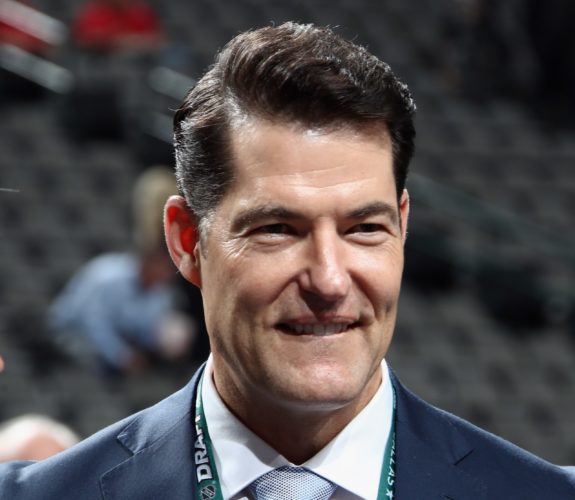
It’s clear that Tocchet isn’t getting the job done in Arizona, and, as of March 3, he has not received a contract extension from the team. Unless general manager Bill Armstrong decides to offer Tocchet an extension sometime during this season, which he arguably has not earned based on the Coyotes’ play under his leadership, he’ll be unemployed at the end of the year.
The Coyotes can’t wait that long – they need to decide on Tocchet’s future in Arizona, and they need to make a decision quickly, before things continue to unravel in the desert.
Coyotes Are Stagnating
In this “what have you done for me lately” league, the Coyotes haven’t accomplished much to write home about as of late. Tocchet’s first year in the desert was a disaster, as Arizona never recovered from a 0-10-1 start and finished 29th in the league with 70 points and a minus-48 goal differential. That 2017-18 season saw many “firsts” for the team – they became the first club in NHL history to fail to earn a regulation win in the first 20 games of a season, and they tied the 1943-44 New York Rangers’ record for the most consecutive losses to start a season, with 11.
Despite their brutal performance in Year 1 under Tocchet, the ‘Yotes were better in 2018-19 – they flirted with postseason contention all year, but a 3-5-3 stretch over their final 11 games dropped Arizona behind the Colorado Avalanche and out of the playoff picture.
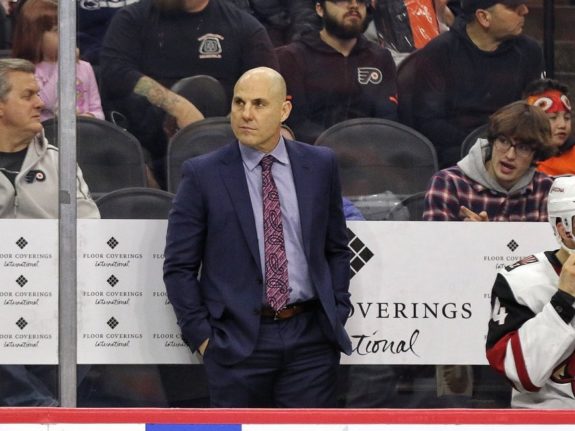
Hopes were high going into 2019-20, but the pandemic-shortened season was another disappointment for Tocchet’s group. After a 25-16-4 start, which saw Arizona leading the Pacific Division as late as Jan. 15, the Coyotes again fell apart in the home stretch – their 7-11-3 record over the season’s final 54 days was better than only the historically bad Detroit Red Wings, and Arizona found themselves in 11th place at the time of the COVID-19 shutdown, with little hope of catching and passing their Western Conference competitors due to tiebreakers and games in hand.
Tocchet’s group received a stroke of good fortune when the NHL announced its 24-team playoff format, and the No. 11-seeded Coyotes took advantage of their new lease on life, beating the No. 6 seed Nashville Predators in four games in the qualifying round. However, any goodwill that the team had generated in their surprise win over the Preds quickly evaporated when Arizona faced off against the Avalanche in the opening round, as the ‘Yotes were manhandled in all facets of the game en route to a 4-1 series defeat, which featured back-to-back 7-1 losses in Games 4 and 5 to seal the Coyotes’ fate.
Coyotes Lucky to Be at .500
This season, it’s been more of the same for Arizona. Since wrapping up a seven-game series against the St. Louis Blues with a 4-2-1 record, the Coyotes have played six games (all at home) and managed to win only two of them. This in and of itself isn’t anything too concerning, but the fashion in which they have lost (and won) these games has certainly raised some eyebrows. In both wins against the Anaheim Ducks, the Coyotes fell behind 3-0 to a team that, if the season ended today, would finish in the bottom-10 in scoring for all teams in the last 80 years.
Despite Anaheim’s team-wide struggles in 2020-21, the Coyotes required improbable comebacks in both games in order to earn their two points. They scored three goals in 3:47 during the second period on Feb. 22 before taking the lead in Period No. 3 to win in regulation, then picked up three third-period goals in a span of 6:34 to force overtime on Feb. 24 in a game which was eventually won in a shootout. Prior to their comebacks, the Coyotes’ play could be characterized by the words ‘apathetic’, ‘disinterested’, and ‘half-hearted’, among others. In particular, the first period on Feb. 22, in which Anaheim outscored Arizona 2-0 and outshot them 16-8, was among the worst 20-minute stretches of hockey for the ‘Yotes in recent memory.

Without these two miraculous comebacks against Anaheim, the Coyotes would be staring at a 0-5-1 mark in their last six contests. A Phil Kessel game-tying goal with under four seconds remaining in the season opener against the San Jose Sharks back on Jan. 14 also earned the Coyotes a surprise point, while a fortunate Clayton Keller equalizer with less than a second remaining on Feb. 8 in St. Louis resulted in a shootout victory. Had these four games went against Arizona, the ‘Yotes would be at the bottom of the NHL with 14 points and a 6-13-2 record.
Two More Colorado Debacles
After their aforementioned comeback victories over the Ducks, the Coyotes welcomed the Avalanche to Glendale for a two-game set, which took place on Feb. 26-27. The Avs entered the series on a bit of a slide, as they had a 2-3-0 record in their previous five games and lost 6-2 to the Minnesota Wild their last time out, but you wouldn’t have known it when watching the product that Tocchet put out onto the ice at Gila River Arena.
On Friday evening, the Coyotes were absolutely lifeless for the first 58 minutes of the game – they once again fell behind 3-0, and would have been losing by a lot more than just the three goals if not for some outstanding goaltending from third-string netminder Adin Hill, who routinely had to bail his teammates out after boneheaded plays and careless turnovers all over the ice. Offensively, Arizona was sitting on just 13 shots on goal at the time of Colorado’s third goal 51 minutes into the action. They managed to improve the optics a bit with two late goals, but there’s no way to sugarcoat how bad of a performance this was against Avs’ third-string goalie Hunter Miska, playing in just his third NHL game. The Coyotes didn’t even make him work for his first career NHL win.
Surprisingly (or perhaps unsurprisingly, depending on how you look at it), the Coyotes were even worse one night later against the same opponent. For the sixth consecutive game, Arizona’s opposition scored first, with Nathan MacKinnon getting on the board at 12:16 of the first period. To the ‘Yotes credit, they actually played pretty well in the opening 20 minutes, outshooting Colorado 9-7 and generating some quality chances in the offensive zone.
That all evaporated in the second period – the Avs began the middle frame on the power play and proceeded to fire pucks at goaltender Antti Raanta with no mercy. They generated five shots on goal in the first 1:20 and reached the double digits in less than four minutes. Arizona’s 9-7 lead on the shot clock quickly turned into a 17-9 deficit, and things continued to go downhill as Colorado finished with 20 shots in the period. Amazingly, Raanta yielded only a single goal during the onslaught as Arizona, for the second consecutive night, hung around in a game they had no business being in thanks to their goaltender.
Things deteriorated in the third period, though, as Colorado added four goals to complete the 6-2 blowout of an overmatched Coyotes squad. For long stretches of action, the ‘Yotes could not even manage the simple task of getting the puck out of their own zone, and when they did, it was quickly turned over in the neutral zone or at the Avs’ blue line. This should have been a 10-2 game for Colorado, but Raanta somehow managed to stand tall under unrelenting Avalanche pressure before allowing three goals in the final eight minutes.
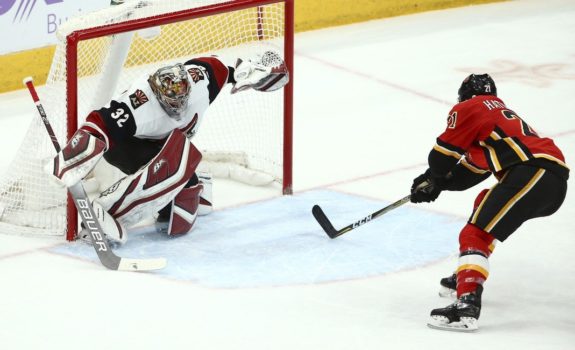
Before we move on, let’s be clear on one thing – the Colorado Avalanche are a skilled, deep, very good team that will likely contend for the Stanley Cup for the next couple of years. They’ve consistently demonstrated that they’re a vastly better hockey team than Arizona at this point in time. However, they aren’t the 1976-77 Montreal Canadiens – they’re not destroying every team they face.
It’s just the Coyotes.
The Avs were blown out by the Wild on Feb. 24 immediately before coming to Glendale last week, then were smacked around by the Sharks on Monday night in their first game after leaving Arizona. Similarly, the Avs looked very mortal and beatable when they faced (and lost to) the Dallas Stars in the second round of the 2020 Stanley Cup playoffs, just days after annihilating the Coyotes over the course of a week.
When Colorado plays Arizona, the games play out as if an NHL team was facing its AHL affiliate club, but none of the other 29 teams in the league seem to have this problem. Even the Ottawa Senators have managed to pick up a few wins over the juggernaut Toronto Maple Leafs this year. At some point, you’ve got to look at the coaching staff as to why things haven’t gotten better for the Coyotes.
Coaching Mistakes Mounting
The lack of adjustments made by Tocchet and his staff became apparent over the last two games, but they’ve extended well beyond just the continued embarrassments against the Avalanche, who, in the last seven meetings between the clubs, have outscored Arizona 31-12 and outshot them 255-151.
Recently, the Coyotes have been plagued by penalties for too many men on the ice – the occasional penalty for too many men can be blamed on the players for a bad line change, but Arizona has been whistled for this penalty in four of their last five games, including in three straight from Feb. 20 to Feb. 24.
The inability to complete line changes within the rules has resulted in the Coyotes racking up a league-leading total of six bench minors this season, five of which have been for too many men.
Additionally, some of Tocchet’s in-game decisions have been perplexing, to say the least. Alex Goligoski, who has been known as an offensive defenseman throughout his career, has seen his production drop off of a cliff this season with one point through 21 games. He had recorded 30 or more points in six of his previous seven seasons, so this is a troubling development for the soon-to-be 36-year-old.
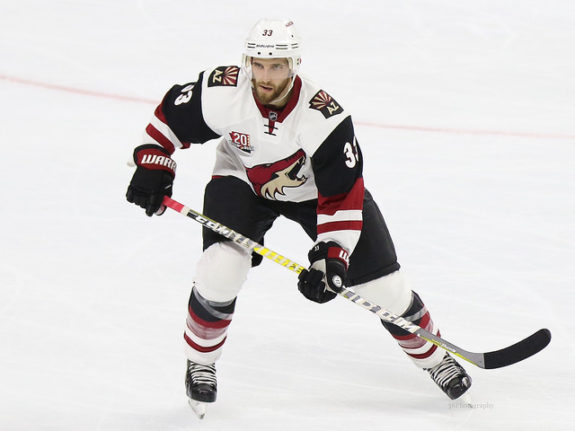
Not only is Goligoski no longer producing offense, but he’s also been susceptible in his own zone, with a growing tendency to turn pucks over and throw clearing attempts up the middle of the ice. Despite his struggles, Goligoski continues to receive huge amounts of ice time, at 22:13 per game. He’s the regular partner of No. 1 defenseman Jakob Chychrun, sure, and has been playing a more defensive role to enable Chychrun to help out offensively, but he’s been a massive liability in the Coyotes’ end in his 13th NHL season.
While we’re on the subject of personnel usage, Tocchet’s past handling of Conor Garland has been curious, to say the least. The Scituate, MA product played a measly 12:47 per game as a rookie in 2018-19, but still managed to score 13 goals in just 47 games – a 23-goal pace. In Year 2, Garland’s ice time remained low, at 14:09 per game, which ranked eighth among Coyotes forwards, but the former fifth-round pick still managed to lead the team in goals with 22 in 68 games.
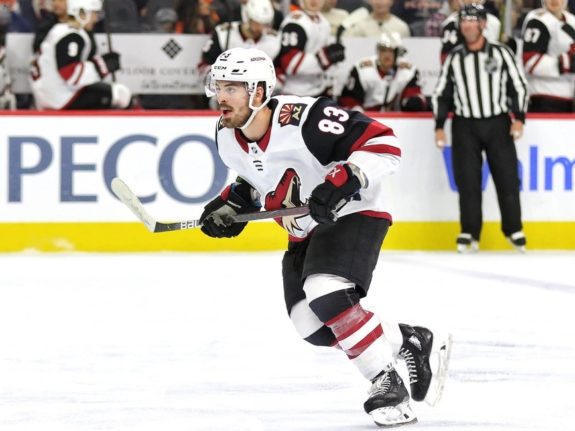
The fans were practically begging Tocchet to give the hard-working Garland more ice time – they finally got their wish this season, and Garland has emerged as a superstar, picking up 19 points through 20 games while playing 18 minutes a night.
Coyotes’ Decision Time Approaching
When he was hired back in 2017, Tocchet signed a four-year contract to be Arizona’s head coach, as we previously discussed. Now, in Year 4, Tocchet is still without a contract extension. Conventional wisdom says that, if the organization was planning on offering Tocchet a contract extension, then they would have already done so at some point, likely after Arizona’s success against the Predators in the Edmonton playoff bubble, or perhaps after Armstrong was hired in September.
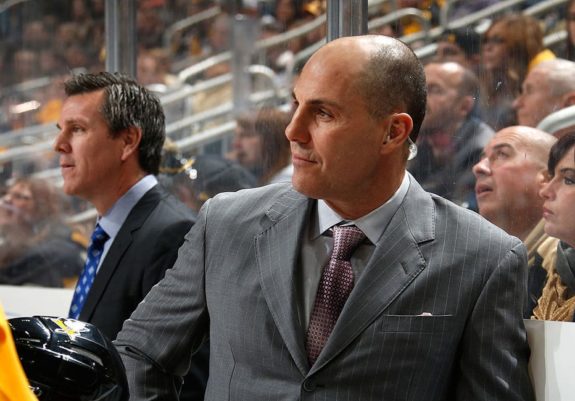
However, no such extension was granted, and Tocchet will be without a contract once the 2020-21 season concludes on May 8. If the Coyotes aren’t planning on bringing Tocchet back, they need to just save everyone the time and effort and fire him now. There’s no sense in playing out the string with a “lame duck” coaching staff that probably won’t be back next year – every game Tocchet is behind the bench for from here on out is a missed opportunity for another coach to step in, evaluate the roster, and perhaps orchestrate a turnaround for a team which, on paper, has three solid goaltenders, a deep, experienced blue line, and a forward group comprised of both up-and-coming youngsters as well as key veterans. This is a better team than their record might indicate.
Possible Replacements?
If the Coyotes do elect to move on from Tocchet at some point, there are countless quality names out there that are likely looking for their next opportunities. By making this move during the season, Arizona would get a head start on the rest of the league in a coaching search, as multiple other teams (like the Anaheim Ducks, Detroit Red Wings, Buffalo Sabres, Montreal Canadiens, and the brand-new Seattle Kraken, among others) will also be looking for new bench bosses this summer.
The first name that comes to mind is former Vegas Golden Knights coach Gerard Gallant, who was unexpectedly fired in the middle of last season. Gallant earned league-wide praise for the job he did in Vegas’ inaugural season, guiding the “Golden Misfits” all the way to the Stanley Cup Final. He was out of a job less than two years later, though, and he’ll undoubtedly be looking for another opportunity in 2021-22.
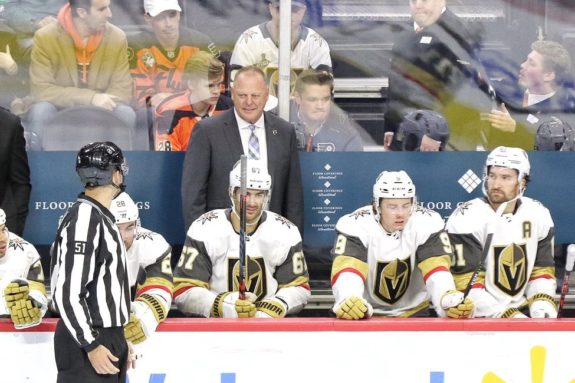
Another well-respected coach who is currently unemployed is Bruce Boudreau, who last coached the Minnesota Wild and was, like Gallant, fired midseason in 2019-20. Boudreau has caught a lot of criticism for his teams’ lack of success in the postseason, but he owns a career regular-season points percentage of .635, which is the third-highest in league history for a coach with more than 500 games of experience.
Darryl Sutter is also an intriguing name – the two-time Stanley Cup champion has been out of coaching since 2016-17 and is reportedly retired from being a head coach, but he’s stayed involved in the game as an advisor to the Ducks’ staff, a position he accepted in 2019. Could he be wooed back into the head coaching ranks? Sutter’s former lead assistant and successor with the Los Angeles Kings, John Stevens, is also available – he was fired by the Kings just 13 games into his second season there, but led a 12-point turnaround in 2017-18 and got LA back to the playoffs before being a fall guy at the start of the club’s ongoing rebuild. He’s been an assistant with the Stars since 2019-20, and could be looking to once again try his hand as a head coach.
Some other names that the Coyotes should consider are current Stars assistant Todd Nelson, who has had a lot of success at the IHL and AHL levels, making the playoffs in each of his 10 seasons and winning three championships as a bench boss.
Former Stars coach Jim Montgomery, who struggled with addiction and lost his job in Dallas as a result, has recovered after receiving treatment and is now working as an assistant in St. Louis – will he get another chance as a head coach?
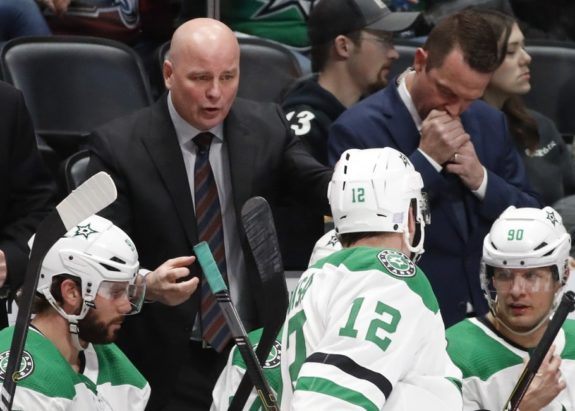
At any rate, there is no shortage of qualified coaches available, and the Coyotes should seriously consider moving onto a new leader before any more time is lost this season. Despite all of their recent struggles, they’re just two points out of a playoff spot in the West Division.
Better, more accomplished coaches than Tocchet have been fired for far, far less in recent years – it’s time for the Coyotes to rip off the bandage, take their medicine, pay the piper – insert your preferred idiom here – and relieve head coach Rick Tocchet of his duties.